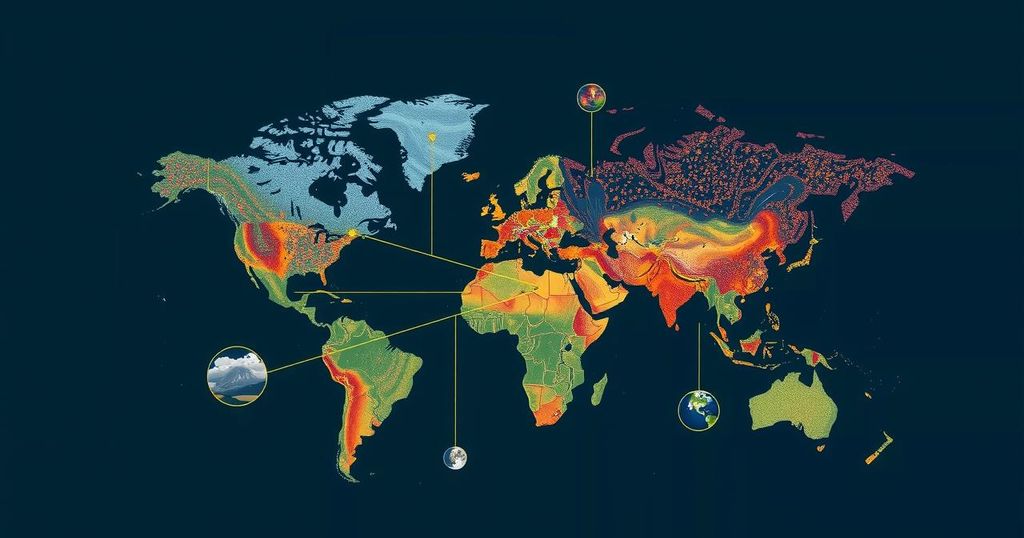Eric Schmidt’s recent comments at an AI summit suggest that AI should take precedence over climate action, claiming that AI will eventually resolve these issues. However, while AI has benefits, it also contributes significantly to energy consumption and thus climate change. Companies like Google and Amazon are exploring nuclear energy to meet AI’s demands, but this raises environmental concerns. Prioritizing AI could neglect urgent climate action needed to protect vulnerable populations.
In a thought-provoking speech at a recent AI summit in Washington, D.C., Eric Schmidt, the former CEO of Google, made several contentious claims about the future of artificial intelligence (AI) and its relationship with climate change. He suggested that society should not restrict AI’s energy consumption for the sake of combating climate change and even advocated for prioritizing advancements in AI before addressing environmental challenges, arguing that AI innovation would eventually resolve climate issues. While Schmidt’s remarks align with his substantial investments in AI technologies and acknowledge the potential benefits AI brings to various sectors—including energy management and climate modeling—there are significant concerns regarding the framing of AI as a primary solution to the climate crisis. Although AI can provide pivotal assistance in mitigating environmental challenges, presenting it as a substitute for urgent climate action is fundamentally flawed. AI itself generates considerable energy demands; data centers and the requisite model training consume vast quantities of energy, thus contributing to increased carbon emissions. Doubling the number of AI data centers, as suggested by Schmidt, could potentially elevate global carbon emissions by up to 80%. Furthermore, expert predictions assert that by 2027, AI-related electricity consumption could rival that of entire nations such as the Netherlands or Sweden. Evidence from the United States indicates that the life cycle of coal-fired power plants is being extended to meet the energy demands generated by AI, which can necessitate up to ten times more computational power than traditional online searches. Moreover, companies like Google, Amazon, and Microsoft are exploring advanced nuclear energy as a solution to satisfy AI’s escalating energy requirements. While nuclear power may be clean in terms of carbon emissions, it raises environmental and safety concerns that demand critical scrutiny. Nuclear energy, despite its reliability and economical viability, poses risks associated with toxic waste and potential militarization. Therefore, reliance on nuclear power should complement the pursuit of renewable energy sources rather than replace it. The implications of sidelining climate action in favor of AI are dire, particularly for vulnerable populations who disproportionately bear the consequences of climate change. Mitigating climate impacts is not merely a technological challenge but a moral imperative that demands immediate attention. While AI holds great promise in enhancing sustainability, it cannot supplant the systematic and policy reforms necessary to address the multifaceted nature of climate change. In conclusion, while AI serves as a powerful instrument in addressing environmental issues, it must not eclipse the urgent global demand for climate action. A balanced approach that integrates AI technology with renewable energy development, policy reform, and international collaboration is essential in navigating the complexities of the climate crisis. The conversation around AI and climate cannot merely revolve around technological advancement; it must prioritize immediate actions to safeguard the future of our planet and its most vulnerable inhabitants.
The discussion surrounding the prioritization of artificial intelligence (AI) development relative to climate change has gained considerable traction, particularly in light of rapid advancements and significant investments in AI technologies. Eric Schmidt’s remarks at a notable AI summit reflect a belief that AI innovations could eventually address climate issues, but this perspective raises concerns regarding the environmental impact of AI operations and the potential detriment of postponing climate action. Furthermore, major technology firms are increasingly exploring energy solutions to accommodate AI’s needs, including nuclear power, which complicates the discourse about sustainable practices and energy sources.
The discourse surrounding AI and climate change necessitates a balanced and immediate approach. While AI possesses the potential to enhance climate action, prioritizing its advancement over urgent environmental considerations poses significant risks. A concerted effort to integrate AI with renewable energy initiatives, alongside pressing systemic reforms, will ensure that solutions to the climate crisis are not merely technological but encompass broader policy and social frameworks. To effectively combat climate change, we must act now, acknowledging that the challenges we face are multifaceted and require comprehensive strategies beyond technological innovation alone.
Original Source: techinformed.com






